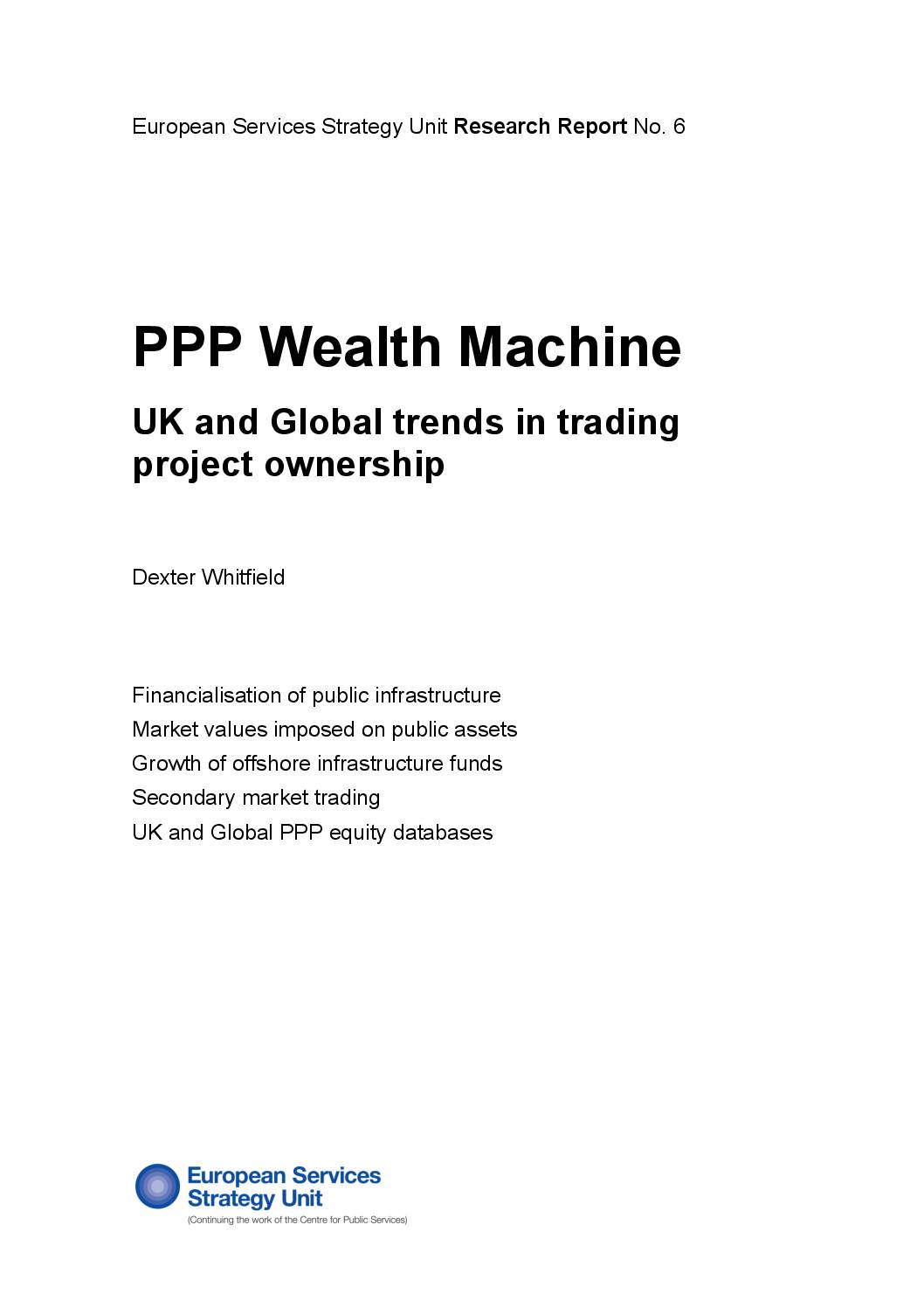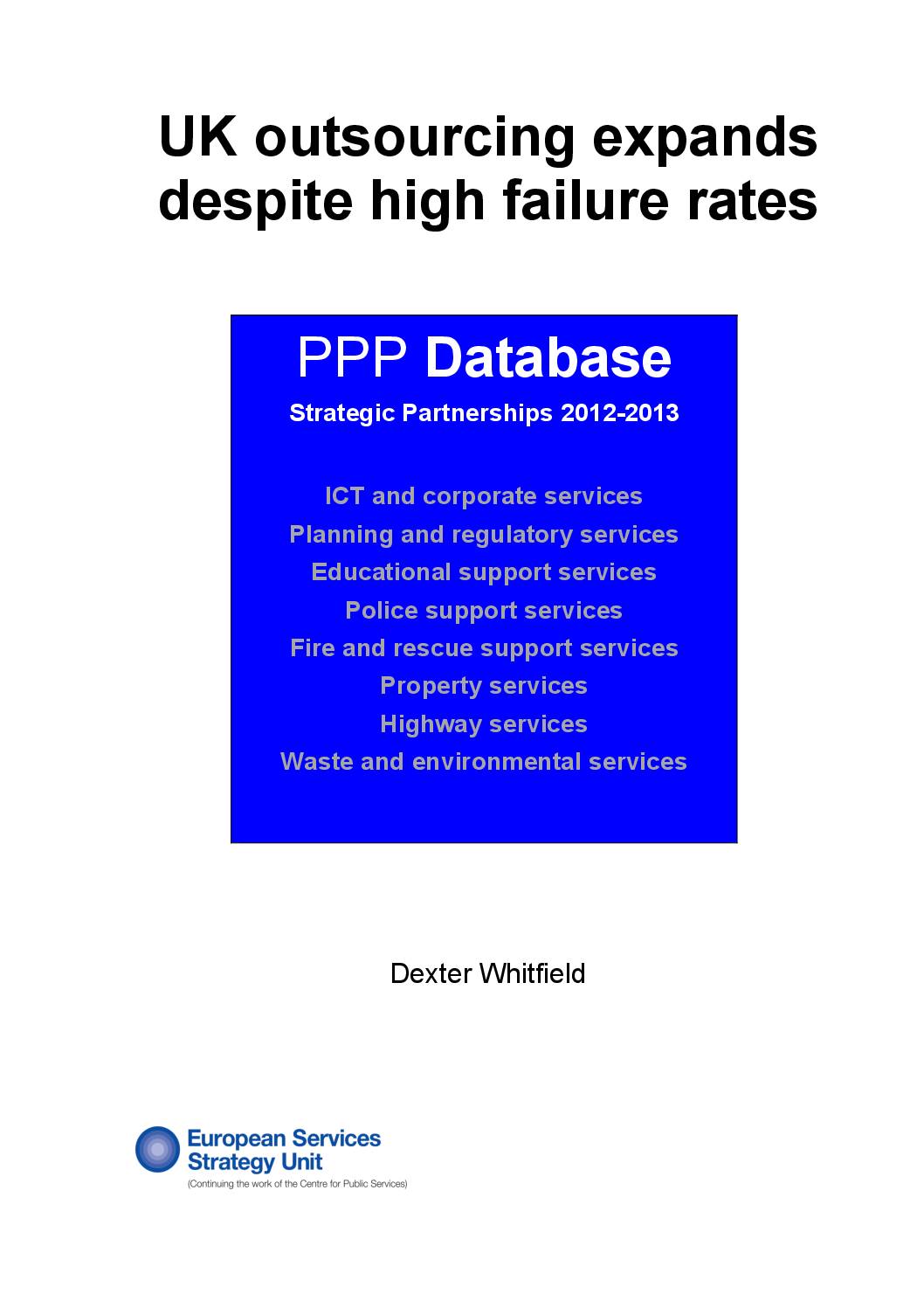The number of PPP strategic partnerships has increased 35% in just two years with 18 additional contracts valued at £8bn. 60 contracts are currently operating, four were terminated and one completed the contract term, but was not renewed. A further two are being terminated in 2014. Strategic partnerships originated in ICT and corporate services, but have extended into planning, education, police, fire and rescue and property services. The failure rate is very high – nearly 1 in 4 contracts are either terminated, reduce scope as services are brought back in-house, and/or suffer major financial and operational problems. Savings, new business and new jobs targets continue to be illusive.
-
Should we turn the NHS into co-ops and mutuals?

Explains why the transfer of NHS and other public services to social enterprises, mutual or cooperatives is privatisation, irrespective of the ownership model, staff and user engagement, democratic structures and community support. It examines the pathways to markets, the performance of social enterprises and the way forward including the re-integration of client and contractor and strategic improvement of in-house NHS services.
-
The Crisis in Adult Social Care

An eBook by Ian Ferguson and Michael Lavalette that examines recent developments in social work with adults, including the personalisation agenda, and critically discusses the prospects for adult social care in a context of never-ending austerity. Six respondents, including Dexter Whitfield, comment on the paper followed by concluding a reply to their comments by the main authors. Critical and Radical Debates in Social Work, Policy Press, €8.11.
-
UNMASKING AUSTERITY: Lessons for Australia, by Dexter Whitfield

Documents why austerity failed and its disastrous economic and social effects in Europe and North America and highlights why Australia should not adopt these policies. Government debt continued to increase, reduced demand intensified the recession, negative or weak growth prevailed and the private sector failed to invest. The cost of lost output, reduced wealth, mass unemployment and government intervention runs into trillions in any currency. Austerity advocates were equally committed to embedding neoliberalism in the public sector and the welfare state and reconfiguring the role of the state. Prepared for the Don Dunstan Foundation and Public Service Association of South Australia and published by the Australian Workplace Innovation and Social Research Centre, University of Adelaide.
-
The Way Out of Financial Crisis

Your Choice Barnet Ltd (YCB), planned to make £2m profit over a four-year period from residents with physical disabilities and learning difficulties to subsidize London Borough of Barnet taxpayers. It is, as predicted, in financial crisis. This analysis for the Campaign Against the Destruction of Disabled Support Services (CADDSS) exposes the scale of the company’s financial crisis, the failure to attract new service users and revenue, the totally inadequate approach to engagement and the drastic staff restructuring proposals, which it claimed would not affect service users and carers. The report sets out a detailed case for full and continuing engagement of service users, carers and community organisations, together with staff and trade unions, in the design, delivery and review of service provision. There is a very substantive case for returning Your Choice Barnet services back to in-house.
See earlier reports for Barnet UNISON on the Options Appraisal, Business Case and Business Plan which predicted the financial crisis.
Critique of Barnet Council’s Options Appraisal for Adult Social Care In-House Provider Services (August 2010)
Analysis of Business Case for Local Authority Trading Company (May 2011)
Local Authority Trading Company (LATC) for Adult and Housing Services (January 2012)
-
The Future of European Welfare States

Review by Dexter Whitfield of European Welfare States after the Crisis: Changing Public Attitudes (by Policy Network, Institute for Public Policy Research and The Foundation for European Progressive Studies) in The Spokesman, No. 120, May, 2013 – The paper does not recognise the financialisation, personalisation, marketisation and privatisation of public services and the welfare state, let alone consider them a ‘challenge’ “The reason perhaps lies in the fact that these policies, designed mainly by the last Labour government and accelerated by the Coalition, are intended to privatise the ‘old’ welfare state in order to release public money to more fully address the casualties of, and the needs, of capital.”
-
Climate Finance and markets – a unique toolkit, course, reader, glossary, videos and resources

Climate finance and markets is a collaborative project of the Institute for Policy Studies, Washington DC and the Heinrich Böll Foundation North America. It sets out to understand what climate change means for the financial sector, and what financial sector involvement means for the funding of climate change projects. Reader covers financial trends, private sector actors, international financial institutions and carbon markets and other financial instruments.
-
Fingers in the PFI

Twenty years on from the introduction of the private finance initiative (PFI), Dexter Whitfield examines the effect it has had – and how it’s set to get worse under new Tory plans (PF2) – Red Pepper, Feb/Mar 2013, Issue 188, pages 16 – 18.
-
EU Reform of transnational Posted Workers law and the place of working rights and collective agreements within the Single European Market: European Public Services Briefings 5: by Andrew Morton

The Posted Workers Enforcement Directive and the ‘Monti II’ Regulation: The temporary posting of workers to a member state other than that to which they are based has brought together a complex set of social, economic and regulatory issues within EU law. This paper examines the conflicts of free movement and social rights and the Posted Workers Enforcement directive and the Monti ll and recommends a way forward.
-
PPP Wealth Machine: UK and Global trends in trading project ownership: ESSU Research Report No 6

The average annual return on the sale of equity in UK PPP project companies was 29% between 1998-2012 – twice the 12%-15% rate of return in PPP business cases at financial close of projects. The excess profit could be £2.65bn, all of which benefits private sector companies. This report exposes the real level of profiteering in PFI projects and shows how the government’s new PFI model, Private Finance 2, does nothing to address the profiteering or lack of transparency. Includes a Global database of PPP equity transactions. Also ESSU UK PPP Equity database can be download:


